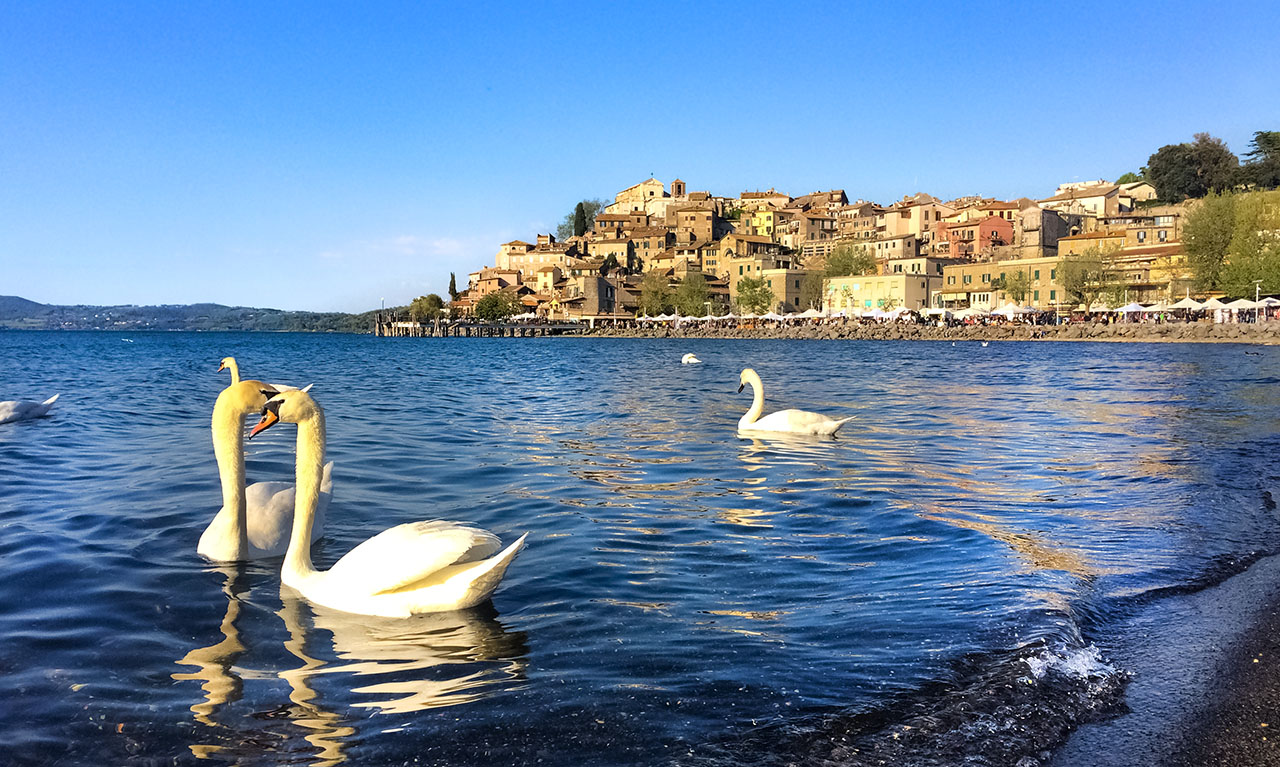Top Day Trips from Rome to Majestic Gardens, Castles, and Lakes
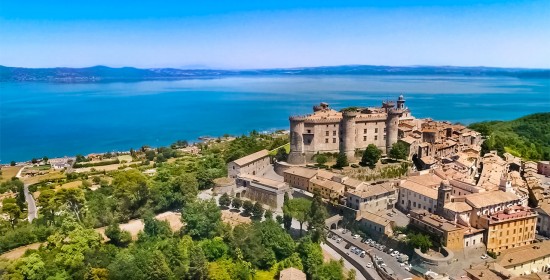
Buongiorno and welcome to Stefano Rome Tours, your go-to tour company for the best day trips from Rome. If you're seeking a break from Rome’s chaotic pace and wish to explore serene landscapes and historical marvels, you’re in for a treat! Just a short drive from the Eternal City, discover the beauty of majestic castles, enchanting gardens, and serene lakes.
In this blog post, we’ll share with you some of the best day trips from Rome to majestic castles, Italian gardens, and tranquil lakes—perfect for those looking to immerse themselves in Italy’s rich cultural heritage and stunning scenery.
Top Day Trips from Rome to Majestic Gardens, Castles & Lakes
1. Lake Bracciano: Castles and Lakes and Charm
Just a short drive from Rome, Lake Bracciano offers a serene escape from Rome’s chaos and crowds. This ancient lake was formed approximately 600,000 years ago by a massive volcanic eruption. The eruption left behind a large caldera, which gradually filled with water over millennia, creating the stunning lake we see today. The lake’s formation as a volcanic crater has given it a unique circular shape and depth that contributes to its pristine water quality.
The lake’s volcanic origins contribute to its remarkably clear and pure waters. The absence of significant inflow from rivers means that the water remains exceptionally clean, making it ideal for swimming and other water activities. The lake’s depth helps maintain its temperature and purity, and stringent environmental regulations help preserve its clarity.
Lake Bracciano’s Charming Lakeside Villages
Surrounding Lake Bracciano are three picturesque medieval villages that enhance the lake’s charm and historical ambiance. These villages, with their historic architecture, offer a glimpse into Italy’s rich past.
Trevignano Romano: Located on the northern shore of the lake, Trevignano Romano is another charming village that invites visitors to enjoy its scenic views and historical sites. The village’s lakeside promenade offers beautiful vistas and is perfect for leisurely walks.
Anguillara Sabazia: Situated on the eastern edge of the lake, Anguillara Sabazia boasts a picturesque waterfront and a historic old town with narrow alleys and traditional architecture. The village’s elevated position provides stunning panoramic views of the lake and surrounding landscape.
Bracciano: The town of Bracciano, perched on the lake’s western shore, is particularly noteworthy. It is home to the imposing Bracciano Castle which overlooks the lake and provides a dramatic focal point against the backdrop of the water. The town’s narrow streets and historic buildings add to its medieval character, making it a delightful place to explore.
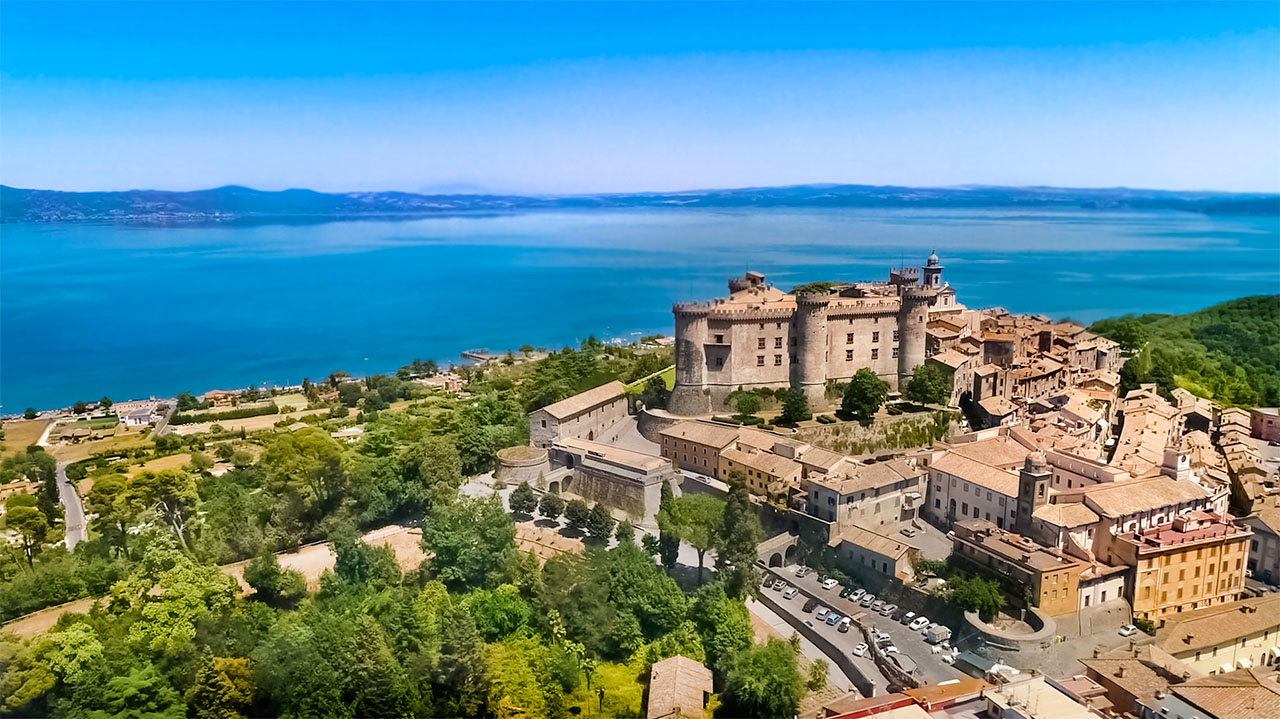
The Medieval Town of Bracciano
The charming town of Bracciano, perched on the lake’s western shore, invites visitors to explore its cobblestone streets and picturesque squares. Bracciano’s history stretches back to ancient times, with its origins linked to the Etruscan civilization. However, it flourished during the Middle Ages, becoming a significant center for the noble families of central Italy.
The historic center of Bracciano is characterized by its narrow, winding streets, charming piazzas, and medieval buildings. Walking through the town feels like stepping back in time, with its well-preserved structures offering a window into the past.
The town offers a range of local shops, markets, and restaurants where visitors can enjoy traditional Italian cuisine and purchase artisanal products. From cozy trattorias serving regional specialties to quaint boutiques offering handcrafted goods, Bracciano provides a delightful shopping and dining experience.

Bracciano Castle: A Medieval Marvel
Sitting proudly above the picturesque town of Bracciano and overlooking the tranquil waters of Lake Bracciano, Bracciano Castle— officially known as Odescalchi Castle (Castello Odescalchi)— is a remarkable testament to medieval fortitude and Renaissance elegance.
Built in the 15th century, this fortress began construction in 1470 under the direction of Napoleone Orsini. It was later completed by his son, Virginio Orsini. Designed to serve both as a formidable military bastion and a lavish residence, the castle reflects a harmonious blend of defensive architecture and refined aesthetics.
The castle’s strategic hilltop location offers sweeping views of Lake Bracciano and the surrounding landscape, showcasing its dual role as a military stronghold and an opulent dwelling. Its robust stone walls and fortified towers are emblematic of the era's defensive architecture, while its Renaissance elements add a touch of sophistication:
In 1696, the castle passed into the hands of the Odescalchi family through marriage. The Odescalchis have since preserved the castle meticulously, ensuring its historical integrity and maintaining its role as a cultural landmark.

Explore the Interior of Bracciano Castle
Stepping inside Bracciano Castle offers a journey through its richly decorated and historically significant rooms, spread across two expansive floors. Each space within the castle reflects the grandeur of its past inhabitants and provides insights into the lives and times of the nobility who once resided here.
A visit to Bracciano Castle unveils a treasure trove of historical and artistic wonders, distributed across its meticulously preserved interiors. The castle, renowned for its architectural splendor and historical significance, features a diverse array of rooms and halls that reflect its grandeur and storied past. Here’s a closer look at the rooms and highlights that await you:
The Armory (Sala delle Armi):
The Armory is a fascinating exhibit of medieval and Renaissance weaponry. Here, you can view an extensive collection of swords, shields, and armor, offering insights into the defensive strategies and martial culture of the era. The armory highlights the castle’s pivotal role in historical conflicts and its strategic importance in regional power struggles.

The Hall of the Caesars (Sala dei Cesari):
This grand hall is adorned with an impressive collection of busts of Roman emperors. It serves as a powerful reminder of the castle's historical weight and its role as a symbol of noble authority. The room’s richly decorated walls and ceilings feature frescoes and intricate details celebrating the legacy of Rome and its emperors.
The Hall of the Canopy Bed (Sala del Baldacchino):
This room showcases the evolution of bedroom design in the Renaissance. The grand four-poster bed with elaborate curtains reflects the transition from shared to private sleeping spaces among the nobility. The room’s decor exemplifies the luxury and refinement enjoyed by the castle’s elite residents.
The Hall of Science (Sala delle Scienze):
Often considered the castle’s library or study, this room is adorned with a frieze depicting various scholarly disciplines. It features Marian icons and Annunciation paintings, highlighting the castle’s intellectual and religious significance.
The Hall of Hercules (Sala d’Ercole):
Named for its paintings depicting the Labors of Hercules, this room is home to a portion of the Odescalchi weapon collection. The room’s decor reflects the family’s admiration for Hercules’ legendary strength and heroism.
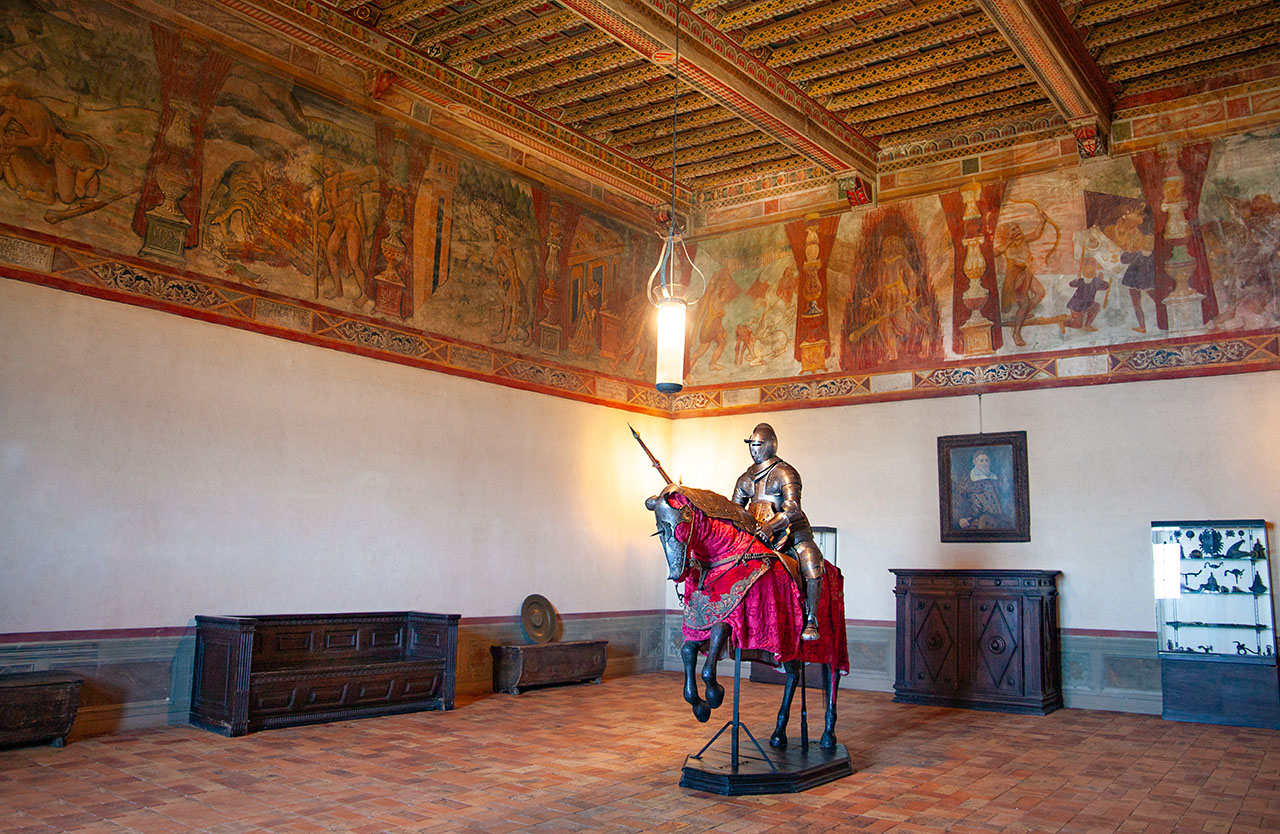
The Hall of Felice della Rovere (Sala Felice della Rovere):
Dedicated to Felice della Rovere, this room includes her portrait and a frieze of historical women. It reflects the castle’s connections to influential figures and offers a glimpse into the roles and achievements of notable women in history.
The Gothic Hall (Sala Gotica):
This room, with its neogothic furniture and unique artifacts such as an ancient hourglass, offers a glimpse into 19th-century historical revival styles. It reflects the fascination with medieval aesthetics that characterized this period.
The Hall of the Orsini Frieze (Sala del Fregio Orsini):
One of the most exquisite rooms in the castle, this hall features a coffered ceiling with roses and family monograms. It is decorated with elaborate frescoes that celebrate the Orsini family’s heritage and legends.

The Hall of Diplomacy (Sala della Diplomazia):
This room honors Nicola Orsini III, a prominent 15th-century military leader. It showcases the Orsini family’s influence in European politics and their interactions with other powerful figures of the time.
The Hall of Women (Sala delle Donne):
This room, adorned with frescoes of noble women engaged in various activities, is inspired by Christine de Pizan's “The Book of the City of Ladies”. It reflects the contributions and roles of women in the castle’s history.
The Hall of Paolo Giordano II (Sala di Paolo Giordano II):
This Baroque room honors Paolo Giordano II and his wife, Isabella Appiani. It features marble busts by Bernini and William the Flemish, reflecting their cultural contributions and friendship with notable figures such as Queen Christina of Sweden.
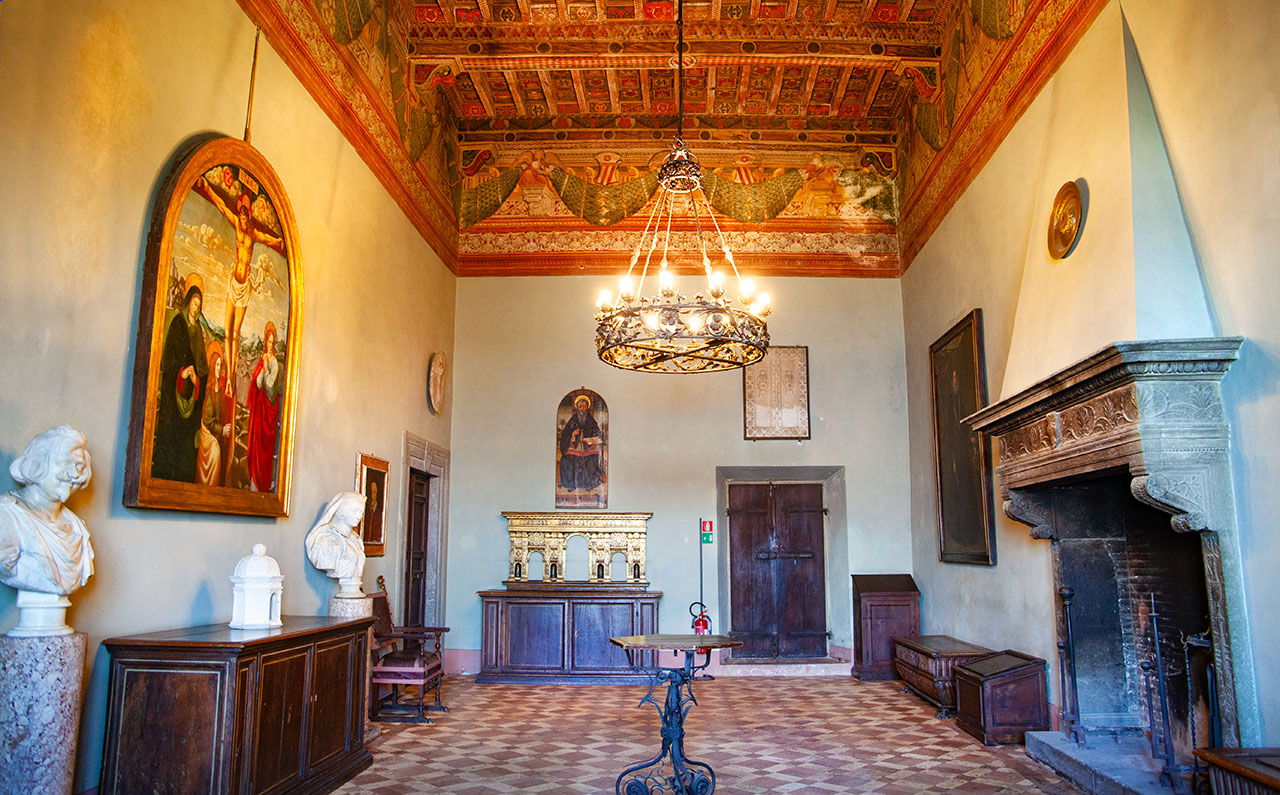
The Hall of King Umberto I (Sala del Re Umberto I):
This room celebrates King Umberto I’s visit to Bracciano Castle in the late 19th century. It also honors Livio Odescalchi, who played a significant role in Italy’s unification and was a prominent art collector.
The Hall of the Pope (Sala Papalina):
Located in the tower by the main entrance, this room possibly hosted Pope Sixtus IV during a plague in the 15th century. The ceiling, decorated with frescoes by the Zuccari brothers, celebrates the marriage of Paolo Giordano Orsini and Isabella de' Medici.
The Studiolo of Baldassare Odescalchi:
This small, intimate room was Baldassare Odescalchi’s study. It houses his travel journals and reflects his opposition to papal temporal power, as well as his contributions to the restoration of Bracciano Castle and his role in the Industrial Art Museum of Rome
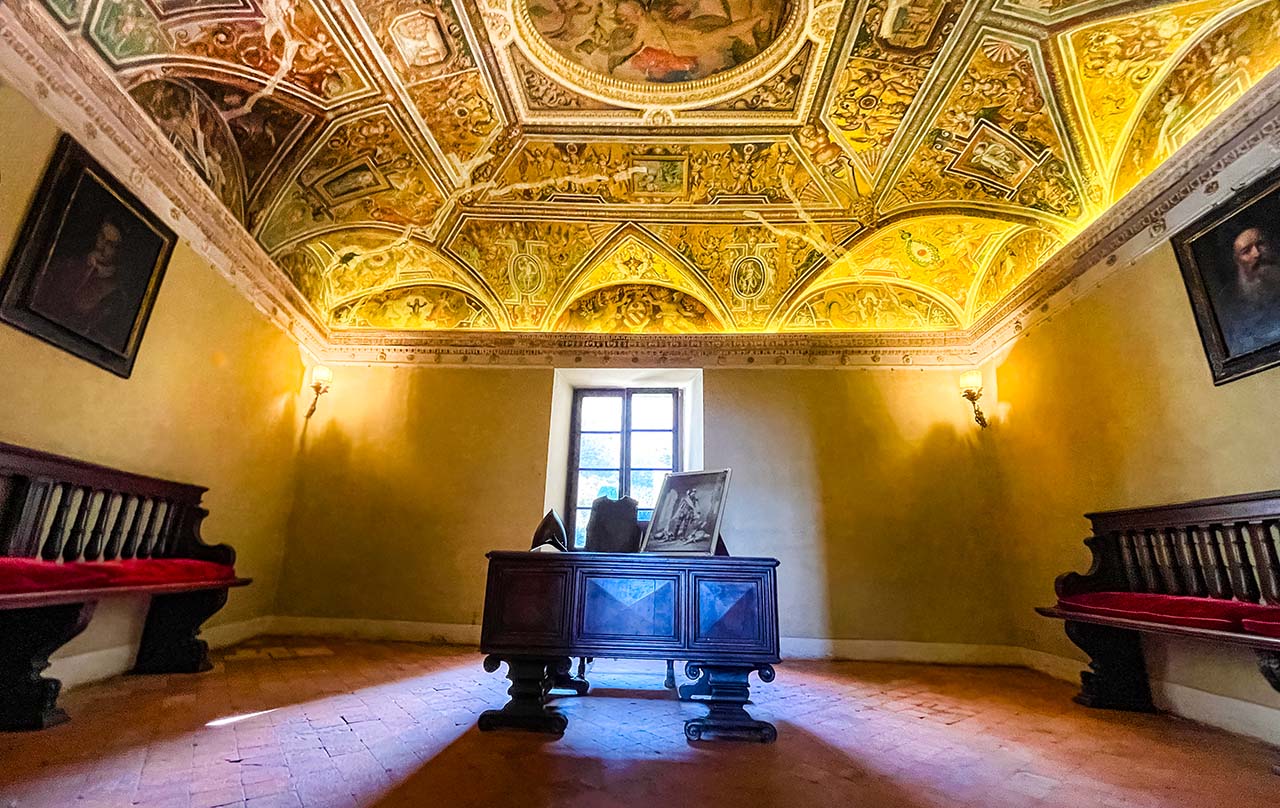
.
Bracciano Castle’s Panoramic Views and Unique Architectural Features
As you explore this historic fortress, you'll encounter a range of architectural elements that highlight both its strategic importance and its opulent past.
The Monumental Staircase:
The Monumental Staircase is one of Bracciano Castle’s most impressive architectural features, designed to create a grand entrance to the heart of the castle. As you ascend this magnificent staircase, you’ll be struck by its sheer scale and intricate design, which reflect the grandeur of Renaissance architecture.
The staircase leads to the Court of Honor, a triangular courtyard that echoes the layout of early Roman Renaissance citadels. This space was used for ceremonial and public gatherings, underscoring the castle’s role as both a fortress and a seat of power.
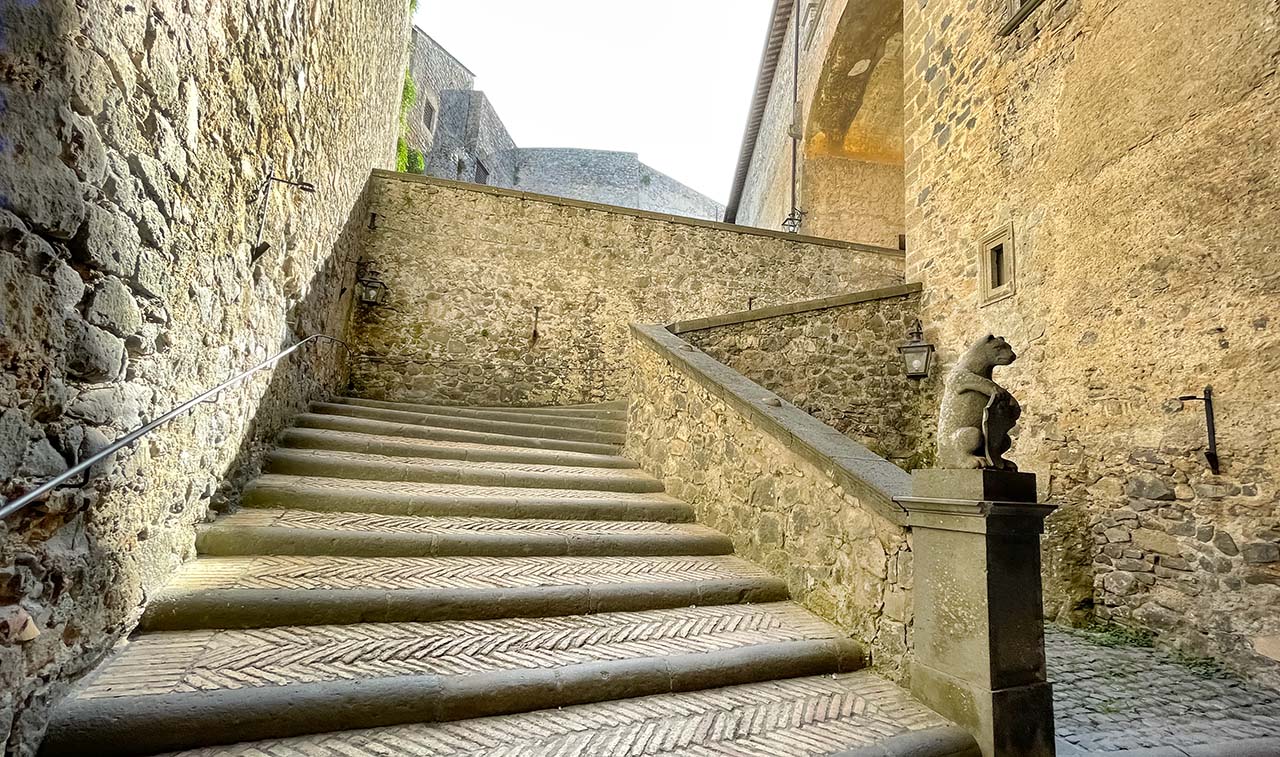
The Rocca dei Vico:
The Rocca dei Vico is a historic section of Bracciano Castle that remains from its original medieval construction. This area is crucial for understanding the evolution of the castle’s architecture from its medieval origins to its Renaissance transformation. The Rocca dei Vico’s rugged stone walls and defensive features stand in contrast to the more refined Renaissance elements found elsewhere in the castle.
The Military Walkway and Loggia:
The military walkway is a vital component of Bracciano Castle’s defensive architecture. This elevated pathway, designed for patrolling and defense, allows visitors to walk along the castle’s ramparts and experience the structure’s military ingenuity firsthand.
The walkway provides unparalleled views of Lake Bracciano and the surrounding landscape, offering a sense of the strategic oversight once enjoyed by the castle’s defenders. The Loggia, featuring arched windows that frame the vistas, serves as both a defensive feature and a space for contemplation. Its design reflects the castle’s dual role as a fortress and a residence, blending practical defense with aesthetic elegance.
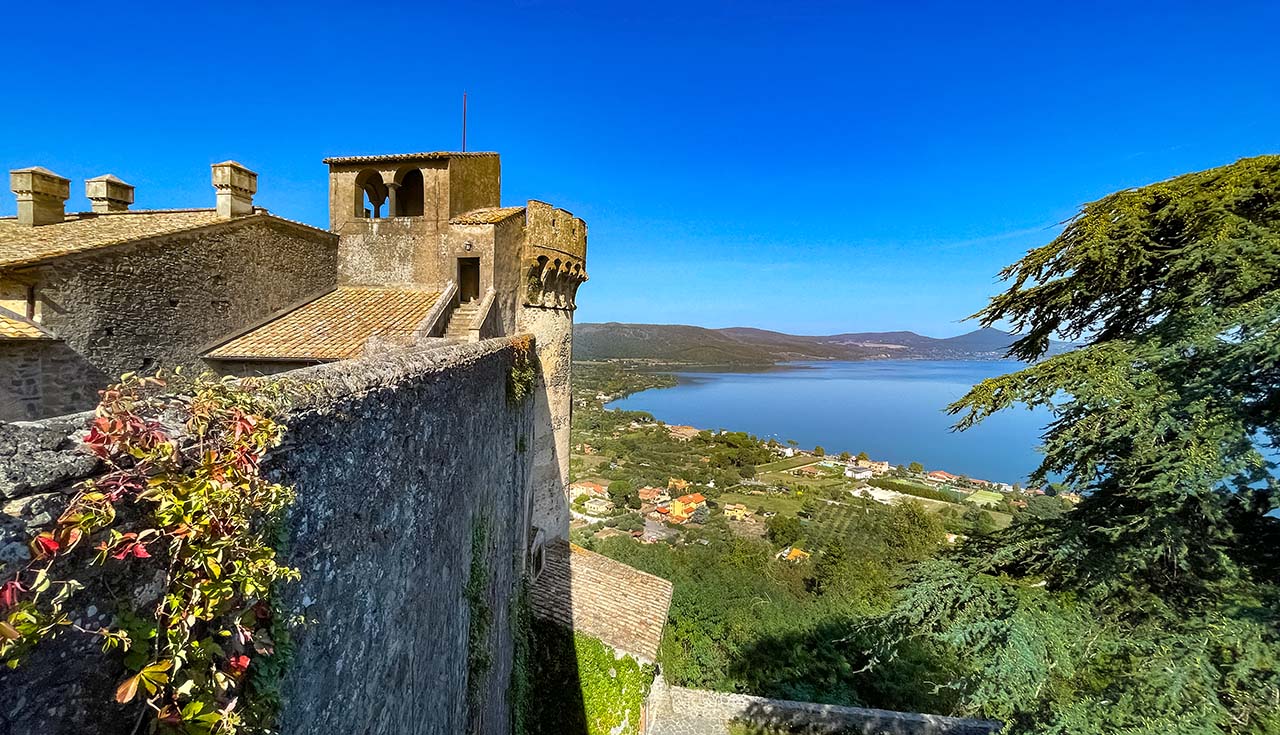
Bracciano Castle stands as a testament to the rich history and opulence of Italy’s Renaissance nobility. Its meticulously preserved rooms, grand halls, and panoramic views provide a captivating glimpse into a bygone era of power, luxury, and artistic achievement.
Rome Countryside Tours to Bracciano
Stefano Rome Tours offers two captivating day tours from Rome that combine historical exploration with scenic beauty. Whether you’re drawn to the grandeur of medieval fortresses or the allure of ancient civilizations, these tours promise enriching experiences and unforgettable memories.
Castles and Lakes Tour from Rome:
Stefano Rome Tours' Castles and Lakes Tour takes you to the majestic Bracciano Castle, a masterpiece of Renaissance architecture perched above Lake Bracciano. After a thorough exploration of the castle, indulge in a charming lunch in the medieval hamlet of Ceri. The tour continues with a visit to the Cerveteri Necropolis, where you’ll uncover the mysteries of the ancient Etruscan civilization.
Medieval Wonders Tour from Rome:
This popular Medieval Wonders countryside tour from Rome takes you to Tuscania, Ceri, and Bracciano. Step back in time with a visit to the picturesque town of Tuscania, renowned for its medieval charm and historical significance. Enjoy a leisurely lunch in Ceri, nestled in the rolling countryside, before delving into the rich history of Bracciano Castle. This tour offers a perfect blend of historical exploration and serene countryside views, making for a truly memorable day.
For cruisers concluding their cruise in Civitavecchia and heading to their hotel in Rome, Stefano Rome Tours also offers Post Cruise Castles and Lakes Tour from Civitavecchia and Post Cruise Medieval Wonders Tour from Civitavecchia with convenient pick up at your cruise ship in Civitavecchia, and drop off at your hotel in Rome at the conclusion of the tour.

2. Tivoli: Villas of Elegance and Splendor
Step away from the lively streets of Rome and embark on a tranquil journey to Tivoli, a town renowned for its historical villas and breathtaking gardens. Stefano Rome Tours invites you to experience the timeless beauty and grandeur of Tivoli through an exclusive day tour that showcases two of Italy’s most illustrious sites: Hadrian’s Villa and Villa d’Este. This tour promises a perfect blend of ancient imperial opulence and Renaissance sophistication.
Hadrian’s Villa: A Roman Emperor’s Grand Retreat
Begin your adventure at Hadrian’s Villa, a vast estate constructed by Emperor Hadrian. Spanning over 250 acres, this villa was designed as a luxurious escape for the emperor and reflects a blend of architectural styles from across the Roman Empire. Hadrian, inspired by his travels, created a retreat that combined elements from Greece, Egypt, and Rome into a grand complex.

An Imperial Oasis Fit for an Emperor
As you explore the remains of Hadrian’s Villa, you’ll encounter a remarkable array of architectural features that highlight the emperor’s grand vision and eclectic tastes. This expansive complex, constructed in the 2nd century AD, merges Roman, Greek, and Egyptian influences into one awe-inspiring retreat.
Below are five must-see sites within Hadrian’s Villa that capture its historical significance and artistic grandeur.
The Canopus
One of the most iconic elements of Hadrian’s Villa, the Canopus is an elongated pool inspired by the Serapeum in Alexandria. Flanked by columns, statues, and a curved colonnade at one end, this monumental water feature symbolized Hadrian’s admiration for the cultural richness of Egypt. The tranquil reflection of sculptures on the water adds to its visual impact, illustrating the emperor’s skillful blend of architectural traditions.

The Baths of Hadrian
Testifying the emperor’s love for luxury and Roman bathing culture, the Baths of Hadrian exhibit sophisticated water management systems and intricate mosaics. Divided into multiple sections for hot, warm, and cold baths (caldarium, tepidarium, and frigidarium), these spaces were not only functional but also provided a lavish social environment. Visitors can still admire fragments of mosaics that hint at their former splendor
The Maritime Theatre
This circular complex, also known as the Maritime Theather (Teatro Marittimo), stands on a small artificial island encircled by a moat. A tiny villa in its own right, it offered Hadrian an exclusive retreat for privacy and contemplation. The site showcases a mix of curved porticoes and graceful columns, reflecting both the emperor’s desire for seclusion and his penchant for innovative design.
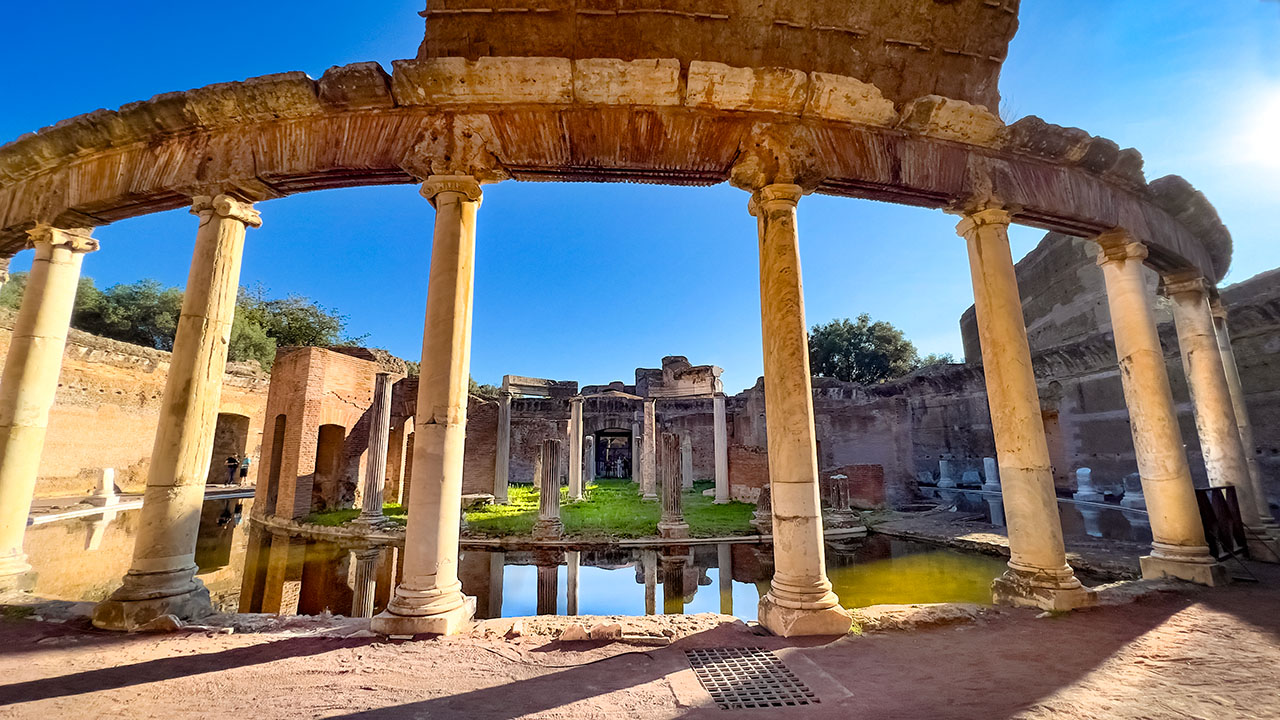
Piazza d’Oro
Often referred to as the “Golden Square”, Piazza d’Oro was a grand courtyard showcasing some of the villa’s most elaborate architectural and decorative elements. It included an ornate nymphaeum (monumental fountain) and luxurious rooms with marble floors and lavish frescoes. This extravagant space exemplifies Hadrian’s commitment to creating a palace that balanced functionality with aesthetic sophistication.
The Poikile
Named after the famous Painted Stoa in Athens, the Poikile was a large rectangular courtyard adorned with colonnades, gardens, and a sizable reflecting pool. It served both as a scenic promenade and a leisure area for the emperor and his guests. Surviving remains of columns and walls give an impression of the grand scale and decorative richness that once made this area a focal point of the villa.
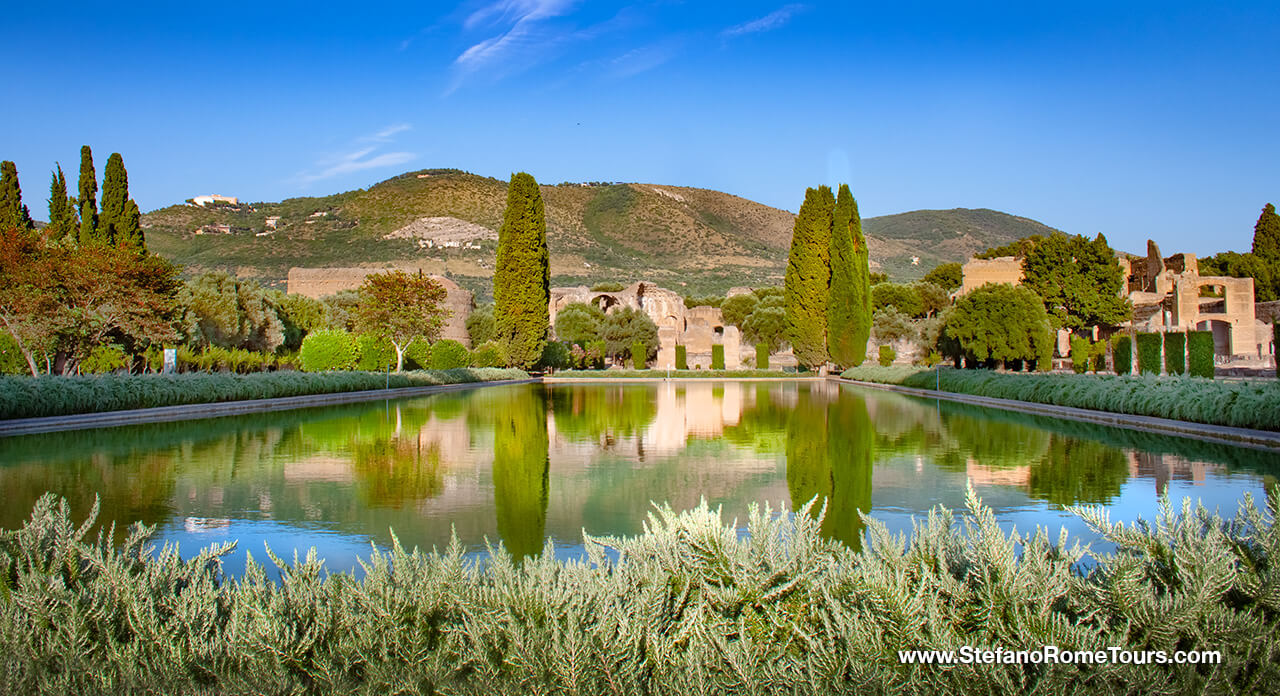
Villa d’Este: Renaissance Splendor and Gardens
Next, immerse yourself in the splendor of Villa d’Este, a masterpiece of Renaissance garden design and a UNESCO World Heritage site. Commissioned by Cardinal Ippolito II d’Este in the 16th century, this villa exemplifies the Cardinal’s opulent tastes and the era’s innovative approach to landscape architecture.
Renaissance Elegance and Architectural Brilliance
At the heart of Villa d’Este is the villa itself, a magnificent Renaissance palace designed by the esteemed architect Pirro Ligorio. The villa features classical proportions, ornate frescoes, and elegant rooms that reflect Cardinal Ippolito’s luxurious lifestyle. The foyer, adorned with painted biblical scenes, offers a glimpse into the villa’s original grandeur.
The Cardinal’s Apartments, including the Salon and the Cardinal’s Bedroom, showcase elaborate decorations and artistic achievements. The Salon, with its panoramic views of the gardens and the Tiburtine countryside, features frescoes depicting virtues, while the bedroom’s coffered ceiling and gilded symbols reflect the Cardinal’s refined taste.
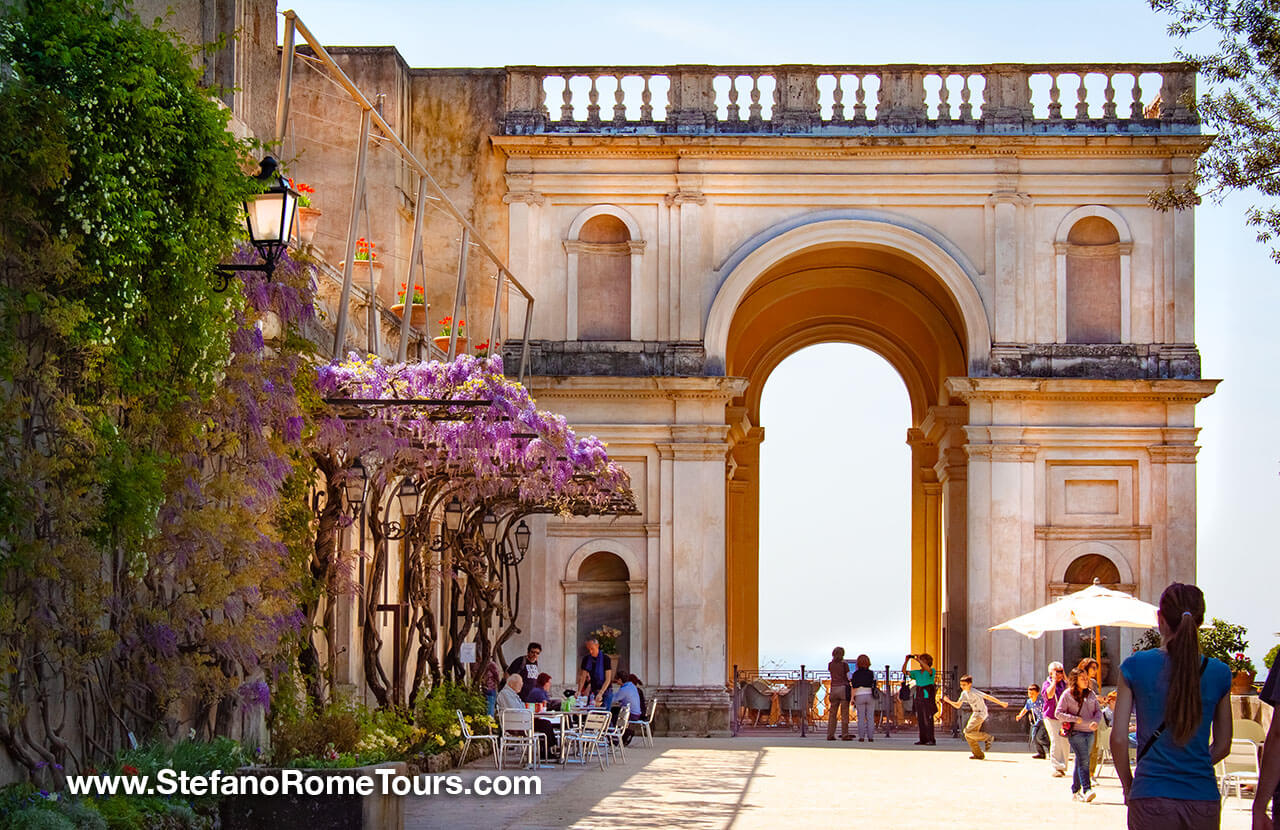
Villa d’Este’s gardens are celebrated for their innovative hydraulic engineering and artistic design. These intricate water features, powered by a sophisticated system that channels water from the Aniene River, stand as remarkable examples of Renaissance ingenuity. Below are a few of the must-see fountains that capture the splendor of Villa d’Este:
Fountain of the Dragons (Fontana dei Draghi)
Four dragons spout water in a dramatic display, symbolizing Pope Gregory XIII. Located at the heart of the garden, this fountain’s powerful water jets and serpentine figures make it one of Villa d’Este’s most iconic sights.

The Oval Fountain (Fontana dell’Ovato)
This grand oval-shaped fountain features a cascading waterfall effect. Statues represent the local rivers of Tivoli, and the fountain’s design perfectly blends Baroque drama with Renaissance symmetry.
The Hundred Fountains (Cento Fontane)
A long avenue lined with numerous small fountains, each decorated with sculpted eagles, lilies, and other motifs. The gentle trickle of water along this corridor creates a soothing ambiance as you stroll through the garden.

The Fountain of the Organ (Fontana dell’Organo)
Perhaps the most technologically fascinating, this fountain once featured a hydraulic organ that played music solely through the force of water. Although it no longer functions as it originally did, the fountain still stands as a testament to Renaissance-era innovation.
Fountain of Neptune (Fontana di Nettuno)
A 20th-century addition designed to replace an older water feature, the Fountain of Neptune impresses with powerful jets and a commanding presence. Its dramatic spray contrasts beautifully with the more delicate fountains around it.

Tivoli Villas Tour from Rome
Experience Hadrian’s Villa and Villa d’Este on a day trip from Rome to Tivoli Villas with Stefano Rome Tours. Enjoy the convenience of a dedicated English-speaking driver who will ensure an enjoyable journey. This Tivoli tour from Rome also allows ample free time to savor a leisurely lunch and explore the charming town of Tivoli at your own pace.
For cruisers arriving in Civitavecchia at the conclusion of their cruiser, we also offer a Post Cruise Tour from Civitavecchia to Tivoli to make the most of your Debarkation Day.

3. Villa Lante: A Renaissance Garden Retreat
Located in the historic town of Bagnaia, Villa Lante is a beautiful example of Renaissance garden artistry and architectural finesse. Renowned for its meticulously designed gardens and elegant architecture, this historic estate offers a serene retreat from the bustle of everyday life.
Villa Lante was commissioned in the 16th century by Cardinal Gianfrancesco Gambara and brought to life by the celebrated architect Jacopo Barozzi da Vignola, known for his mastery of Renaissance and Mannerist styles. Though the estate was completed decades later under Cardinal Alessandro Peretti di Montalto, its gardens and twin palazzos remain a unified embodiment of Renaissance ideals—emphasizing balance, symmetry, and innovation in landscape design.
The estate features two nearly identical palazzos, known as the Gambara Casino and the Montalto Casino. Built thirty years apart and reflecting slightly different styles, these twin palazzos serve as understated yet sophisticated backdrops to the surrounding gardens. The Gambara Casino is noted for its frescoes depicting pastoral themes, while the Montalto Casino is adorned with classical frescoes and trompe-l'œil effects that blend seamlessly with its architectural details.

The Gardens: An Enchanting Fusion of Nature and Art
Villa Lante’s gardens are celebrated as one of Italy’s most beautiful examples of Renaissance landscape design. In 2011, they were recognized as the "Most Beautiful Park in Italy", a testament to their exceptional beauty and historical significance. The gardens showcase an exquisite blend of natural beauty and human ingenuity, where advanced hydraulic engineering meets artistic vision.
Upon entering Villa Lante, visitors are greeted by the Quadrat, a geometric flowerbed bordered by tall box hedges. This symmetrical design reflects the Renaissance fascination with order and precision, predating the famous French gardens at Fontainebleau. The Quadrat is accentuated by elegant fountains, sculptures, and decorative urns, all contributing to its sculptural beauty.
Fountain of the Moors
At the heart of the garden stands the magnificent Fountain of the Moors, crafted by the renowned sculptor Giambologna. This central fountain features four life-size Moorish figures holding a heraldic star-shaped water jet that shoots gracefully into the sky, becoming a focal point of the garden's visual splendor.

Water Features: Engineering Marvels
The gardens are renowned for their sophisticated water features, designed by the esteemed hydraulic engineer Tommaso Ghinucci. Visitors will encounter cascading fountains, water stairways, and intricate grottos that create a dynamic sense of motion and tranquility.
The Catena d’Acqua, or "water chain", is a signature feature that elegantly channels water through a series of carved stone steps, symbolizing the natural flow of life and reflecting the Renaissance ethos of harnessing and shaping nature for artistic purposes.
One of the upper terraces of Villa Lante features a large stone table with a narrow water channel running through its center. Known as the Fountain of the Lamps, this area was used by Cardinal Gambara for entertaining guests. The table is adorned with small oil lamp-shaped fountains that produce delicate jets of water, enhancing the atmosphere of leisure and opulence. Surrounding this terrace are lush camellias and flowering shrubs that contrast beautifully with the stone structures.

Villa Lante is not just a garden but a masterpiece that has evolved over centuries, seamlessly integrating Renaissance ideals with advanced hydraulic engineering. Every element, from the terraced gardens and intricate fountains to the elegant twin palazzos, reflects a timeless pursuit of harmony, order, and beauty.
A visit to Villa Lante offers a unique opportunity to experience one of Italy’s most extraordinary gardens, where history, art, and nature converge in perfect harmony.
4. Bomarzo Monster Park: A Journey into the Fantastical
Immerse yourself in a world of whimsy and wonder at the Bomarzo Monster Park, also known as the Sacro Bosco or Sacred Grove. Located in the enchanting town of Bomarzo, this 16th-century garden offers an extraordinary departure from traditional landscape design, making it a must-visit for those seeking a blend of historical intrigue and imaginative artistry.
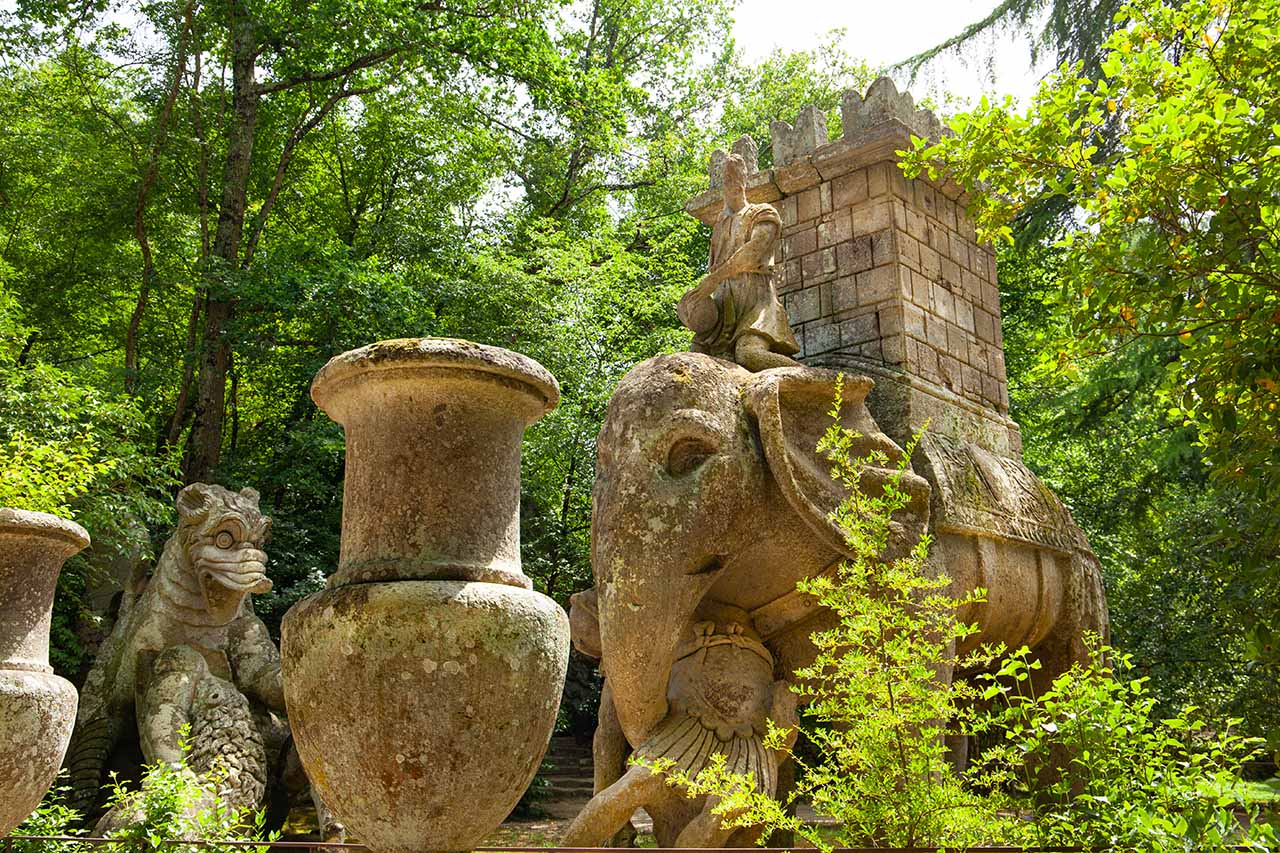
A Vision Beyond Convention
Bomarzo Monster Park was conceived by Prince Pier Francesco Orsini as a poignant tribute to his late wife, Giulia Farnese. Rather than opting for a serene and orderly retreat, Orsini commissioned a garden that would astonish and provoke thought, reflecting his complex emotions through an array of fantastical and grotesque sculptures. The park’s design, attributed to the celebrated architect Pirro Ligorio, and its surreal sculptures, crafted by artist Simone Moschino, combine to create a garden unlike any other.
Unlike the meticulously arranged Renaissance gardens of its time, Bomarzo is characterized by its irregular and chaotic layout. This deliberate deviation from symmetry and order invites visitors into a dreamlike realm where the boundaries between reality and fantasy blur. The park’s expansive grounds are dotted with larger-than-life sculptures carved directly into the bedrock, including mythological figures, wild beasts, and bizarre human forms.
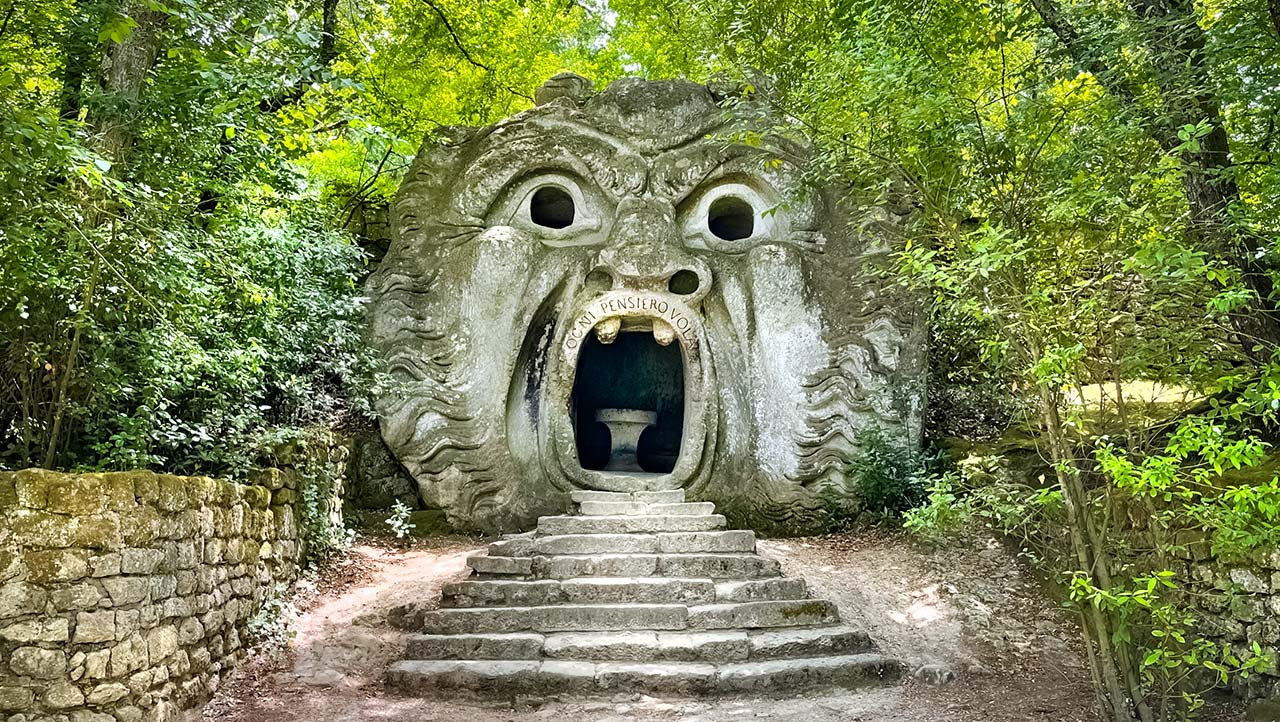
Sculptural Wonders and Symbolic Intrigue
At the heart of Bomarzo’s surreal landscape are its iconic sculptures, each imbued with symbolic meaning. Among the most striking is the colossal war elephant, which symbolizes the Carthaginian general Hannibal’s historic invasion of Rome.
This imposing figure, with its trunk crushing a Roman soldier, captures a moment of monumental power and conflict. Another notable feature is the Ogre, a massive open-mouthed face inviting visitors to step inside its gaping jaws, with the inscription "All Thoughts Fly", adding a layer of psychological depth to the experience.
The Leaning House (Casa Pendente) is another fascinating element of Bomarzo, its tilted form creating a disorienting effect that challenges perceptions of gravity. This whimsical building, along with the Temple of Eternity and the Sleeping Nymph, enhances the park’s enigmatic atmosphere, encouraging visitors to explore and interpret the garden’s unconventional designs.
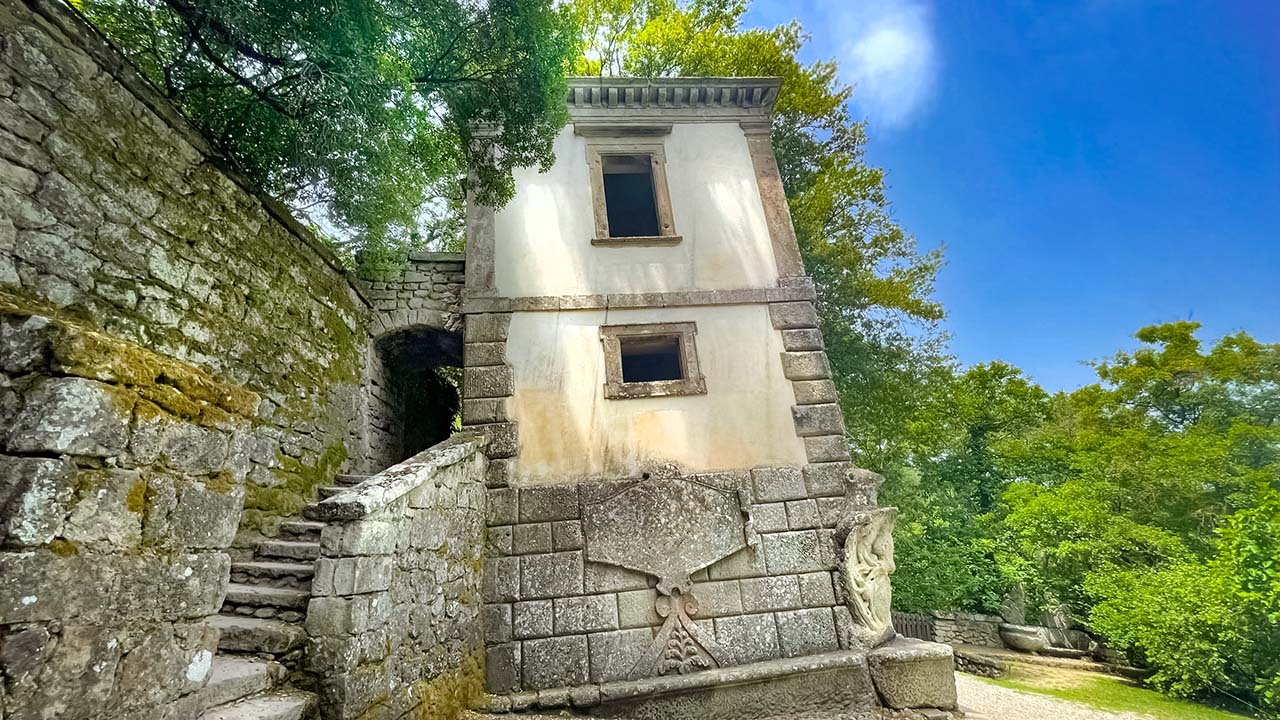
Mystery and Symbolism in the Garden
Bomarzo’s layout and its sculptures remain shrouded in mystery, inviting visitors to ponder their deeper meanings. Some scholars suggest that the park represents a Mannerist reaction against the formalism of nearby Renaissance gardens like Villa Lante and Villa Farnese. Instead of offering clear, serene vistas, Bomarzo’s tangled pathways and fantastical features invite visitors to lose themselves in its imaginative and unpredictable landscape.
Adding to the garden’s mystical allure are the inscriptions scattered throughout the park, many penned by notable poets such as Annibal Caro and Cristoforo Madruzzo. These verses, some now weathered and faded, allude to themes of life, death, and the human condition.
One inscription, “Sol per sfogare il Core” ("Just to set the heart free"), reflects the personal and emotional undertones of Orsini’s creation—a space where grief, love, and memory are intertwined in a garden of fantastical forms.
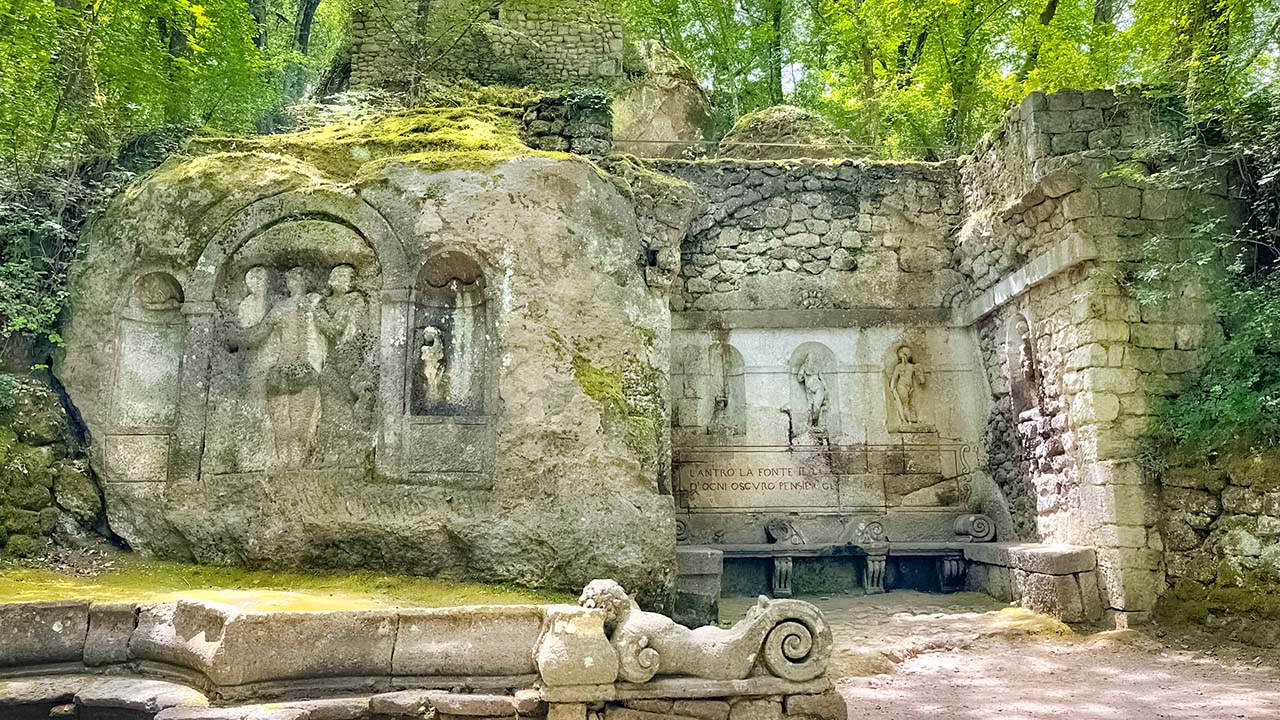
Bomarzo Monster Park offers a unique and unforgettable escape into a world where art, nature, and myth converge in unexpected and whimsical ways. For those with an appreciation for Italy’s rich landscape heritage and a desire for a departure from traditional garden design, Bomarzo provides a captivating and surreal adventure.
Villa Lante and Bomarzo Tour from Rome: "Monsters and Myths"
Experience the perfect blend of elegance and eccentricity with our Monsters and Myths Tour. From Rome, embark on a journey that combines the refined beauty of Villa Lante with the whimsical wonder of Bomarzo Monster Park.
This unique day trip from Rome offers a captivating contrast between the sophisticated artistry of Renaissance gardens and the fantastical, surreal sculptures of Bomarzo. Join us for a day filled with both tranquil beauty and imaginative adventure.
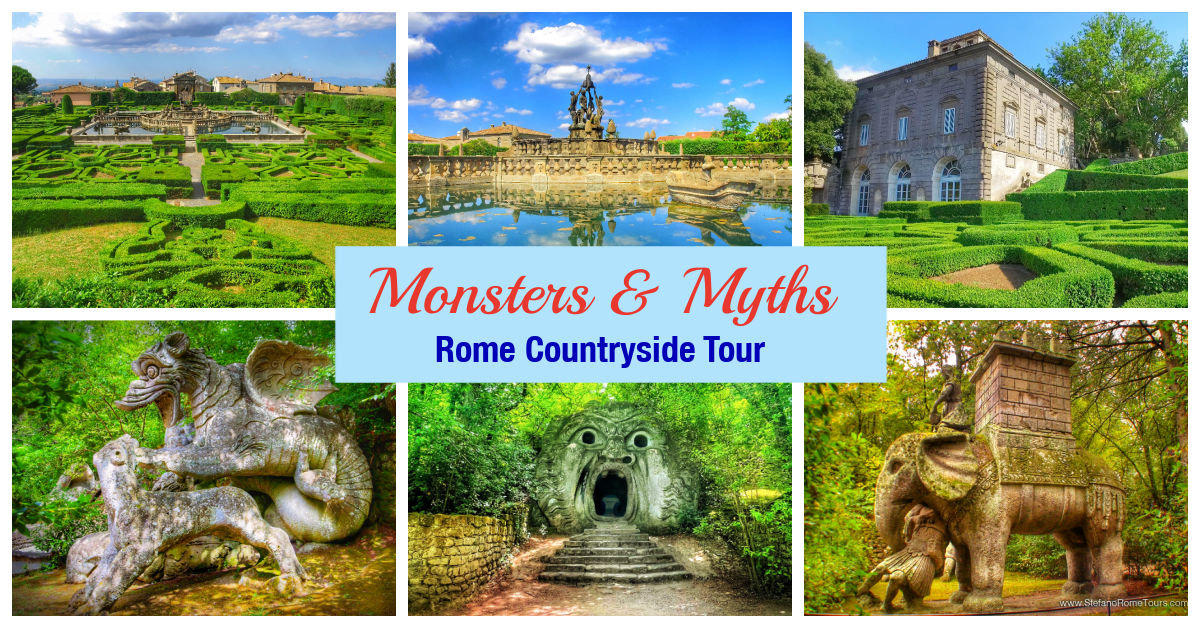
Escape the bustling noise of Rome and journey into the serene beauty of Italy’s countryside on day trips from Rome to majestic castles, gardens, and lakes. Each journey offers a unique opportunity to experience Italy’s rich cultural heritage and breathtaking landscapes.
At Stefano Rome Tours, we specialize in crafting exceptional day tours from Rome, offering deluxe limousine service with English-speaking drivers. Enjoy the convenience of pick-up and drop-off at your hotel, ensuring a seamless and comfortable experience.
Book your perfect day trip with us today and let us help you create lasting memories in the heart of Italy. Explore, unwind, and indulge in the beauty of the Italian countryside with Stefano Rome Tours—where your next adventure awaits.
